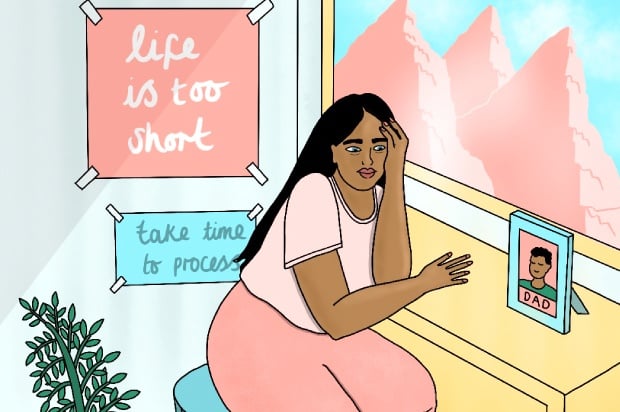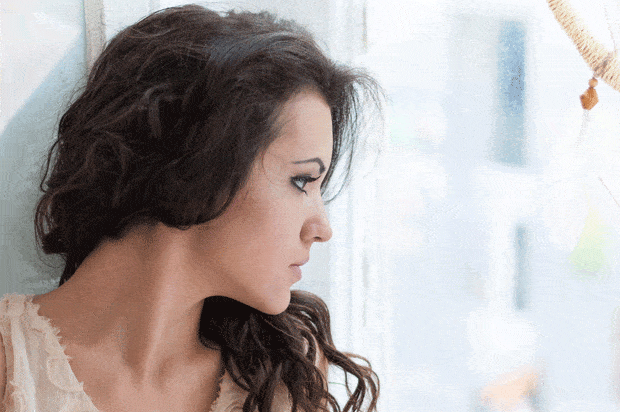Grief: My personal story


Trigger warning: This articles contains references to illness and loss.
Monica is one of our experts in law and employment rights and volunteers regularly as a writer for The Mix. Here she has written a personal story about the loss of her father, to help others who might be grieving.
On the 26th October, it will be the fifth anniversary of my dad’s passing. I probably think about my dad everyday. Something will remind me of him or I’ll watch something and think ‘he would love this’, as he loved films. So, the anniversary in many ways will be like every other day; but the most poignant thing will be reflecting on the five years and honouring my dad’s memory.
I was 23 when my dad passed away from brain cancer. It was a point in my life when I was in the beginning stages of adulthood and generally figuring out life post-university. Losing someone at any age is painful but the impact differs in so many ways. An important thing to remember is that grief is a very personal and subjective experience.
There’s no right way to grieve
Below I want to share some of the most important things I learnt about grieving through my own experiences and I hope it may help anyone who has been impacted by grief to get some solace from knowing they are not alone.
Anger
Contrary to popular belief, the five stages of grief don’t always follow the same pattern. There are many factors that come into play. I remember that instead of denial, I became overwhelmed with anger and felt like I would burst with the emotion at any time. There were people who may have judged me for my reactions but there is no judgment in grief as how someone reacts to loss is different.
Taking time to process
A month after my dad’s funeral, I handed in my notice at work and decided I needed time to deal with my grief. I took nine months off and used the time to deal with my emotions and come to terms with everything. But others may want to get back into their studies or work straight away as they deal with their grief by keeping busy. Some people may have delayed grief in which they won’t feel the loss until months later when out of the blue they burst into tears.
Learning to live with grief
If someone is grieving, then others need to know that grief is different for everyone. No one has the right to tell you how to grieve and for how long. Sadly sometimes people think there is a time frame for grieving and that afterwards you can move on. Those are definitely the wrong ways to think about grief; there is not an on/off button and for many learning to live with grief is more commonplace than just moving on.
I still have some bad days where I feel the need to cry but gradually over time I have learnt to live with the pain. It does not affect my life as much as it did for the first few years. So, for anyone who has gone through this or is currently dealing with grief, give yourself time and do what is right for you.
Positive ways to honour your loved one
I realised early on that I wanted to deal with my grief by honouring my dad’s memory. It felt important to keep his memory alive and to re-direct my sadness into something positive. There are many ways to keep someone’s memory alive. A few months into my time off I went to our local park where we usually walked our family dog. I saw a tree that my dad used to love and knew then I wanted a memorial bench in that exact spot. I contacted my local council and within a few months the bench was erected. Each time I walk past it now I feel connected to my dad.
A public way to honour someone can be to do a fundraiser and raise money for a charity. A month before my dad’s two–year anniversary, I decided to do a 25–mile hike for Macmillan Cancer Support. The Macmillan hospice cared for him during his last weeks. There are so many ways to honour a loved one and how you choose to do so is personal to you. Just remember there is never any pressure to do something if it doesn’t feel right. These are some of the ways I dealt with my grief, but you may choose a different path.
The cliché, “life is too short” is true
The biggest realisation after losing my dad was that the cliché “life is too short” was true. It definitely changed my perspective on many things and after some time I realised how important it was to use my time well and become more present. The realisation may come in different shapes and sizes for everyone, but the important thing I learnt after grieving was that I needed to make myself and most importantly my dad proud. I went on a road trip around California and each time I stopped and looked around I felt like my dad was with me.
Coping with guilt
During the times when grief coloured my life, I started to believe that I would never be happy or be able to move on with my life. I thought that if I started to enjoy life again that I would be moving away from my dad. Guilt is something that crops up alongside grief and it is a normal emotion to feel during those times. But eventually through your support system you realise how precious life is and that your loved one would want to see you happy and successful. Remember to take as much time as you need but to live life to the fullest when the time feels right!
You’re never alone
Dealing with grief can sometimes be a very lonely experience. Even if other family members or friends around you are grieving too; it can still feel like you are the only one going through it, but that’s not the case.
Reach out if you need support
At the beginning, I felt like I had to be there for my mum and so my emotions sometimes took a back seat. I would go to my room and cry or just put on a strong face and carry on as normal.
If you feel like you have no one to talk to or feel like you need help then don’t be afraid to ask for it. There are many resources out there such as The Mix’s support services and Winston’s Wish who have so many useful tips and help for young people going through grief.
A month after my dad passing, I realised that I was not handling things as well as I thought. I booked an appointment with my GP and they were able to organise some bereavement counselling. Counselling is not for everyone and some people prefer to deal with grief alone.
As I said at the beginning, your journey is personal but it is important to remember that even if you feel alone there are people out there to help. Reach out to your friends /family and allow them to be there for you. I was very lucky to have support from my family and friends, which helped tremendously during my journey.
I hope that some of my experiences may help you in some way, if not directly it may allow you to at least own your journey.
If you need support coping with grief
If you’re struggling with grief, know that you’re not alone. There are experts who can support you through this time. Speaking to a bereavement counsellor can make a huge difference.
You can sign up for up to eight sessions of free and confidential counselling at The Mix.
Email [email protected] to get support and advice from their team, or join their live chat service
Read The Mix’s guide to coping with grief.
Next Steps
- Chat about this subject on our Discussion Boards.
By Holly Turner
Updated on 23-Oct-2020
No featured article














